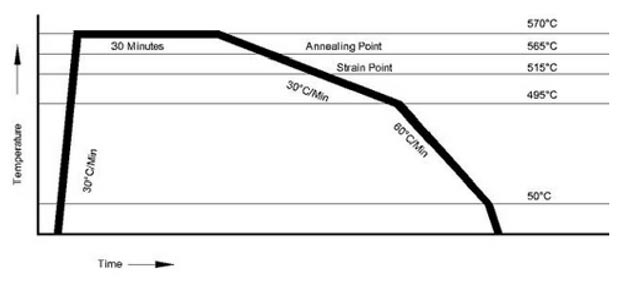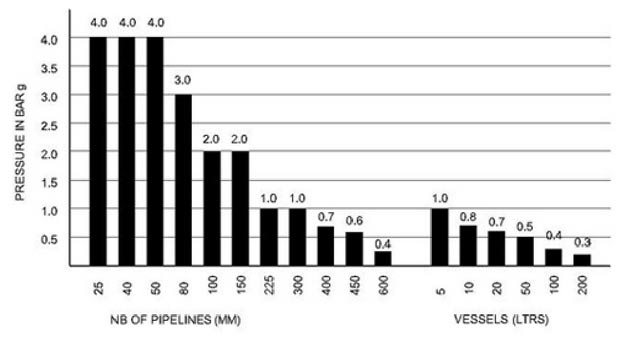Technical Information of Scientific GlasswaresPROPERTIESBorosilicate glass represents unmatched standardized glass for construction of plant and piping in the chemical, dyestuff, food, pharmaceutical, petrochemical industries. Its steadily growing use is due to many advantages over conventional materials.
The chemical and physical properties of any glass depends on a varying degree on chemical composition of glass. CHEMICAL COMPOSITIONThe composition of borosilicate glass used for chemical plants has following approximate composition.SiO2 - 80.6% B2 O2 - 12.5% Na2O - 4.5% Al2 O3 - 2.2% RESISTANCE TO CHEMICALSBorosilicate glass is inert to almost all materials except Hydrofluoric acid (HF), Phosphoric acid (H3PO4) and hot strong Caustic solutions. Of these, Hydrofluoric acid has the most serious effect, even when it is present in PPM (parts per million) in solutions. Where as Phosphoric acid and Caustic solutions cause no problems when cold but at elevated temperature corrosion occurs. In case of Caustic solutions upto 30% concentration can be handled safely at ambient temperature.THERMAL PROPERTIESLinear coefficient of thermal expansionThe coefficient of thermal expansion of borosilicate glass over the temperature 0-300° C is 3.3 x 10-6/°C. This is very low when compared with other glasses and metals. That is why, borosilicate glass is often called low expansion borosilicate glass. Specific heat Specific heat between 25° C and 300° C is average to be 0.233Kcal/Kg,°C. Thermal Conductivity Thermal conductivity is 1.0 Kcal/hr.m°C. over the permissible operating temperature range. ANNEALINGAnnealing of glass is the process where the glass is heated and kept for a defined period of time to relive internal stresses. Careful cooling under controlled conditions is essential to ensure that no stresses are reintroduced by chilling/cooling. RESHAPINGIn the given below are shown characteristic temperature at a determined viscosity, essential for glass reshape.
MECHANICAL PROPERTIESThe lack of ductility of glass prevents the equalization of stresses at local irregularities or flaws and the breakage strength varies considerably about a mean value. This latter is found to occur at a tensile strength of about 700kg/cm². In order to allow for the spread of breaking stress, a large factor of safety is applied when determining the wall thickness requirement to allow operation up to values given in the table of working pressure.OPTICAL PROPERTIESBorosilicate glass show no appreciable absorption in the visible region of spectrum and therefore appears clear and colour less. In photo chemical process the transparency of ultra violet is of particular importance. It follows from the transmittance of material in uv region that photo chemical reactions such as Chlorination & Sulpho Chlorination can be performed in it.ELECTRICAL CHARASTERISTICSGlass being a poor electrical conductor, surface, conductivity is insignificant and varies with the quantity of water absorbed on glass surface. The specific conductivity is 10° ohm/cm at temperature of 200°C.The dielectric coefficient varies with current frequency. DENSITYDensity of glass at 20°C (J)=2.23g/cc Modulus of elasticity (E)=6.3 KN/mm²Poissions ratio=0.2 OPERATING CONDITIONSPERMISSIBLE OPERATING CONDITIONSWorking Pressure For Glass Pipelines & Vessels The permissible internal operation pressure depends on the nominal diameter of the glass components and on working temperature. In case of unit various combination like vessels, filters, heat exchangers, the over all permissible internal gauge pressure is always governed by the components with the lowest permissible operating gauge pressure. All components are suitable for full vacuum. Bar is a measure of absolute pressure. The figure given for maximum recommended working pressure represents pressure above atmospheric.  Working TemperatureBorosilicate glass retains its mechanical strength and will deform only at temperature which approach its strain point. The practical upper limit for operating temperature is much lower and is controlled by the temperature differentials in the glass which depends on the relative temperature of the contents of the equipment and the external surroundings. Provided borosilicate glass is not subject to rapid change in temperature, creating undue thermal shock, it can be operated safety at temperatures upto 250° C.It must be realized that in complete plants, composed not only of borosilicate glass, but also including other materials such as PTFE. The recommend max. operating temperature is 200°C, Operating temperatures may have to be modified so as to compensate for the effects of other factors such as pressure, thermal cycling, rapid heating & cooling etc. The degree of thermal shock (usually defined as sudden chilling or heating) which it can withstand depends on many factors such as stresses due to operating conditions, stresses imposed in supporting the equipment, the wall thickness of the glass. It is therefore undesirable to give sudden temperature changes. But up to 120° C can be accommodated. At sub zero temperature, the tensile strength of borosilicate glass tends to increase and equipment can be used with safety at temperatures as low as -50°C for Xtrong end components. COMPOSITE MATERIALSThe last two decades have seen the new or further developments of particularly corrosion resistant plant construction materials. Typical examples of these are PTFE, tantalum, titanium, graphite and of course Borosilicate 3.3 Glass.The combination of different corrosion resistant materials with the utilization of the specific advantages of each permits both safe and economic construction. Borosilicate glass/PTFEBorosilicate glass with PTFE is of particularly decisive importance for construction of glass installation for example. In seals, bellows, stirrers, pumps, heat exchangers, column inserts etc.PTFE is used in above because of its excellent mechanical & thermal properties. They have near universal fluid compatibility. Wear life when compared with others is very low. Particularly PTFE is maintenance free and have cryogenic stability with non wetting property. Service temperature of PTFE is considered as -50°C to +200° C. © Copyright2017. Shiva Scientific Glass Pvt. Ltd. Delhi, India |





